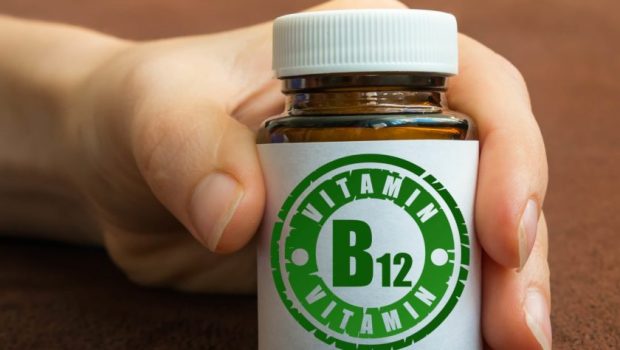Vitamin B12 Deficiency Not Just for Vegans
by Doug Pucci
For patients that feel fatigued, have an increased heart rate, experience shortness of breath, feel numbness or tingling in their extremities, have trouble walking, and/or notice their skin is pale, a trip to the emergency room seems reasonable. While some of these symptoms can be indicators of a health emergency, they can also be indications that the patient, along with about 40 percent of the U.S. population, has a vitamin B12 deficiency.
Traditionally, vitamin B12 deficiencies were associated with vegan and vegetarian diets, because B12 is derived from meats, dairy and eggs, and is a nutrient that the human body can’t produce it on its own. Yet it’s an essential nutrient that is critical for the proper formation of red blood cells, making DNA, and nerve function; without it, some serious conditions can arise. These can include neurological disorders, depression, cognitive difficulties, anemia, paranoia/delusions, loss of taste/smell and vision loss.
Besides diets lacking or containing insufficient amounts of meats, dairy and eggs, long-term use of certain medications can also cause vitamin B12 deficiencies. It’s a dangerously sneaky side effect that does not often express itself until it’s too late. Unlike other drug side effects, like dizziness, nausea, drowsiness, etc., by the time it’s discovered, the deficiency already exists and is sometimes irreversible. Among the medications that have been shown to deplete B12 are the diabetes drug Metformin, proton-pump inhibitors (PPI) which can interfere with the body’s ability to absorb B12, and the Parkinson’s drugs Carbidopa and Levodopa.
Older people can be at risk of developing a B12 deficiency because their bodies produce less stomach acid, which is necessary for B12 absorption. Anyone that has had weight-loss surgery is more likely to have lower B12 levels because the surgery hampers the body’s ability to pull B12 from consumed foods. Some health conditions can also make someone more prone to a B12 deficiency, including pernicious anemia, Crohn’s disease, celiac disease, lupus, Graves’ disease and atrophic gastritis.
Pregnant women need to be especially careful to get enough dietary B12 and folate from leafy green vegetables in their diets because a B12 deficiency can lead to developmental delays in babies.
Besides taking a good B12 supplement, it helps to make sure our diet consists of foods that also deliver the necessary nutrient in whole food forms. These include fish (particularly trout, wild-caught salmon, sardines and clams), poultry, meat (especially liver and kidneys, but avoid processed meats), raw or cultured dairy (a highly absorbable source) and eggs. Nondairy milks like soy, almond, and rice that are fortified can contain decent amounts of B12, as well. While a few plants like seaweed, some mushrooms, and algae contain B12, the body doesn’t absorb it as efficiently from these sources, so while those are all beneficial for other nutrients, they are less so for B12. In other words, vegans and vegetarians need to use other sources of this vital nutrient.
For those that fit into any of the higher-risk categories that are prone to vitamin B12 deficiency, it’s wise to speak with a doctor about getting regular blood tests to monitor levels. If they’re low, they can ask for the recommendation of a high-quality supplement to get them back up to a safe level, and consider changing their diet to include B12-rich foods.
Dr. Doug Pucci, DC, FAAIM, adheres to a functional medicine approach to patient care and believes in treating underlying, root causes of disease. In practice, he provides nutrition, advanced testing for hormones and gut microbiome, blood testing, epigenetics and brain/body well-being. For more information, call 201-261-5430 or visit GetWell-Now.com.




























